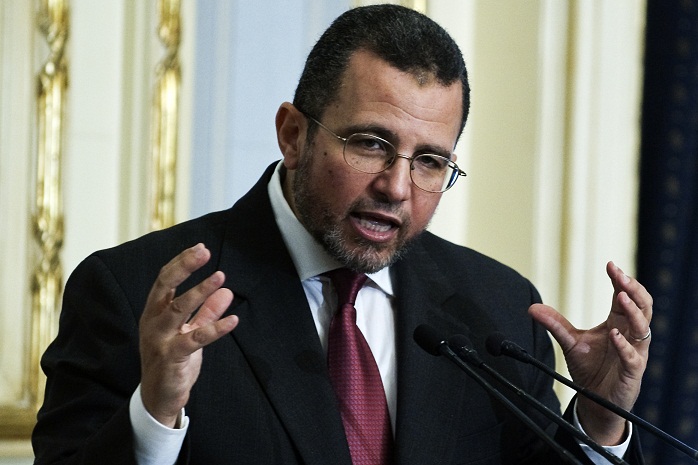By Mennatallah Fouad Youssef
CAIRO: Fourteen months after Hosni Mubarak was ousted, university students are still on the frontlines battling against remnants of the old regime.
After Mubarak’s removal, students debated the idea of reviving an inclusive body to represent them.
On Aug. 20, 2011, the Egyptian Student Union was founded after a week of meetings between student representatives from public and private universities.
A main concern of (ESU) was to create a new student bylaw to represent students and reflect the spirit of the revolution.
“As the first ESU it was important for us to come up with a new bylaw to regulate and facilitate political life in universities, and get rid of the old declaration which for long has been hindering student freedoms,” stated Dawod Fadel Dawod, vice-president of the Cairo University Student Union and member of the ESU.
On Feb. 20, Minister of Higher Education Hassan Khaled announced that a new set of student bylaws has been drafted by the students and will be circulated amongst universities for approval and that union elections would be held by the end of the month.
The minister’s statement caused a lot of spur amongst student unions, and it was brought to light that private universities were not part of the drafting process.
“The bylaw was drafted by representatives from public universities only because it was unrealistic to force private universities to implement it when their union organization is different. We met with them to discuss certain clauses, but this declaration is only to be followed by public universities,” Dawod explained.
According to Dawod, the ESU met with the Minister of Higher Education to discuss its implementation.
“We stated that election cannot be held in universities based on this new bylaw until it has been revised and approved by parliament. As for holding a referendum in universities, the idea is present but we are yet to come up with a process to hold it in an organized fashion because we have universities whose student body exceeds thousands of students such as Cairo University,” said Dawod.
This decision is to be announced in a conference the ESU will hold for students to discuss it.
While students continue to draft documents to bring them more freedoms on campus, they are also keeping the spirit of the revolution across the country until justice, and freedom is achieved.
Engineering students at Cairo University have been protesting since Feb.11 after the death of three of the faculty’s students in Port Said. A general strike and ban on attending classes lasted for a week, while protests continued afterwards.
“The strike began after our friends were killed and two days after that engineering student Abdel Rahman Mowafy got arrested in Tahrir Square while delivering medical supplies to the field hospital. He was arrested along with a visually impaired person and a 14-year-old child,” said Abdel Rahman Ashraf, one of the students at the protest.
“He was charged with possession of drugs and Molotov cocktails and attacking army soldiers. Meanwhile the university was trying to get him out, and around 1,500 students were protesting along with a few professors,” added Ashraf.
A group of students are still protesting after Mowafy was released, calling for other demands.
“Students demand to name three lecture halls after the deceased students, present their parents with honorary graduation certificates since they were about to graduate, and issue an official statement condemning the killings and demanding the prosecution of the directors of the riot police and the police forces in Port Said,” said Ahmed Nabil, member of the Cairo University Student Union.
Similarly, students at the German university in Cairo are protesting the expulsion of two students after they were under investigation for holding protests against the military council.
Three other students were given final warnings and banned from attending classes for two weeks.
“The investigation is illegal,” said a member of the GUC Student Union, who preferred to remain anonymous. “They called us and I only found I was needed for investigation from a friend. We did not have any lawyers and the investigations were informal. They were held by Ibrahim El-Demiery, head of the student disciplinary committee and former transport minister, during the Upper Egypt train accident,” he added.
El-Demiery resigned from cabinet in February 2002 after a fire on train carriage heading to the southern province in Aswan caught fire, killing 350 passengers.
Students from other universities joined the GUC protests in support.
“We have sent an appeal to MPs Amr Hamzawy, Mostafa El-Naggar and Essam Sultan. They are going to deliver this appeal to the Minster of Higher Education and the head of the educational committee inside the parliament in order to investigate in the university’s decision.”
The expelled students say the accusations against them were “funny and absurd.”
GUC has expelled 26 students last March for protesting on campus, however, they returned after their parents appealed and the students apologized.
